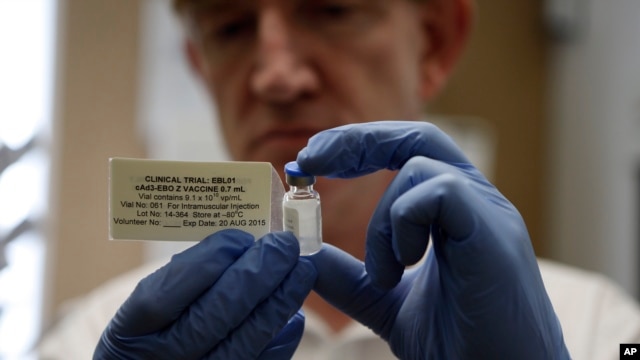
FILE - A researcher holds a vial of an experimental Ebola vaccine in Oxford, England.
GENEVA—
The World Health Organization reports phase-3 trials of possible Ebola vaccines are set to begin at the end of January and early February in Liberia, Sierra Leone and Guinea. Experts who attended a high-level WHO meeting on Thursday reviewed data from clinical trials on three potential vaccines and agreed they were safe and could proceed to the next phase.
Manufacturers have been fast-tracking the development of Ebola vaccines for the past several months. And the speed and urgency with which scientists have responded to this critical need appears to be paying off.
WHO Assistant Director-General Marie-Paule Kieny says two vaccines developed by Merck and GlaxoSmithKline have undergone the first phase of clinical testing, which looks at the safety of the vaccines and the immune response against the Ebola virus.
She says both vaccines have proven acceptably safe, so trials for these two vaccines will begin in a few weeks to test their effectiveness.
“The phase-3 trials of the two lead vaccines — the third phase of testing means giving vaccines to healthy volunteers in the area where the virus is being transmitted and this is to actually test whether they work. And, we have already been informed of plans of a third manufacturer, Johnson and Johnson, to also engage to efficacy testing," said Kieny.
According to the latest WHO figures, the Ebola epidemic so far has claimed 8,259 lives and infected 20,972 people in the three heavily-affected West African countries.
The chair of the high-level meeting and professor at the University of Witwatersrand in South Africa, Helen Rees, says unprecedented and remarkable progress is being made in the development of an Ebola vaccine. While this is encouraging, she says the epidemic is far from over.
“Clearly, what we want to do is eradicate this virus. We do not want to have pockets of virus continuing and continuing. But, for this reason, it is very urgent that we get into the field very quickly to do these clinical trials because if there are very, very, very few cases of Ebola, as I am sure you understand, it is going to be very difficult to test whether the vaccines work or not. So we recognize that we are going to push speed, but without compromising on quality," said Rees.
The WHO experts estimate it will take about six months for results from the phase-3 trials to be known. They say the production of vaccines will go on while the trials are underway. They say they expect to have a huge stock of millions of doses of vaccine available by mid-year.
In another bit of good news, they say the board of GAVI, a global health partnership that provides vaccines to poor countries, has approved funding for Ebola vaccines and for strengthening the fragile health systems in Liberia, Sierra Leone and Guinea. |
|
